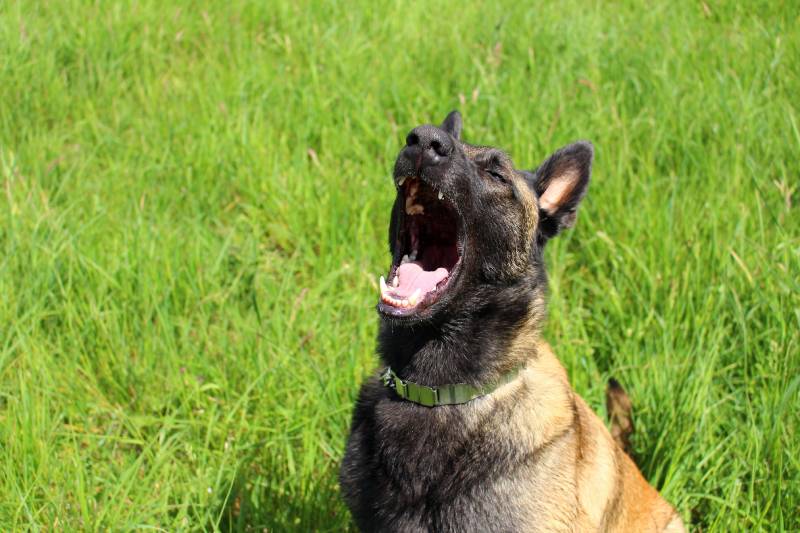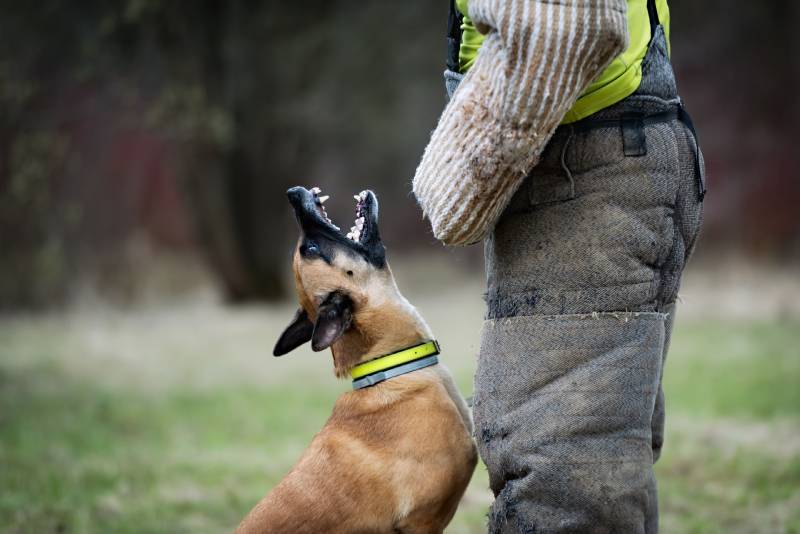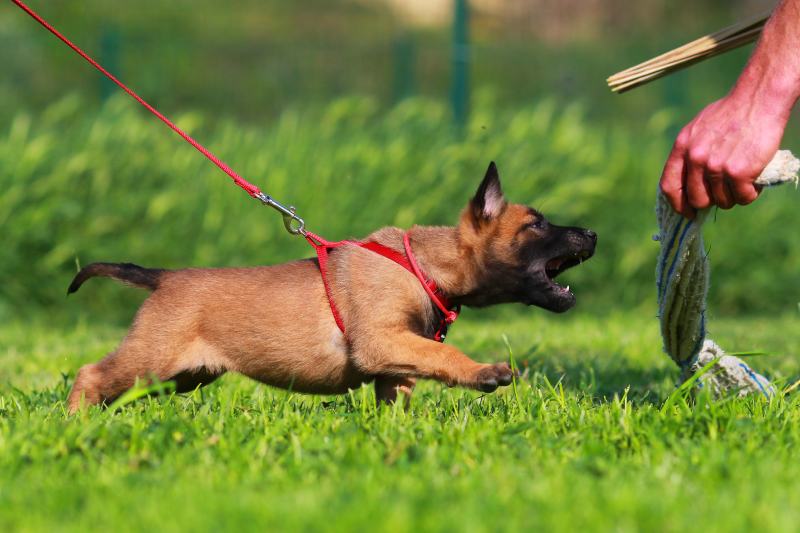Do Belgian Malinois Bark a Lot? Tips to Reduce Dog Barking

Updated on

First bred as a guardian dog for livestock animals, the Belgian Malinois is a vocal breed. Unprepared dog owners might be surprised at this dog’s willingness to use their voices to communicate their feelings when they’re bored, anxious, excited, or seeking attention or for no real reason at all.
Their excessive barking is one of the reasons that many Belgian Malinois and similar dogs are abandoned or surrendered to shelters. This guide goes over the reasons that these dogs bark and how you can teach them to bark only when necessary.
Do Belgian Malinois Bark Frequently?
Frequently confused with the more popular German Shepherd, the Belgian Malinois has a similar role in today’s society. Like the German Shepherd, they were originally bred as a herding dog, and their versatility, intelligence, and loyalty made them suitable for work in the police force and the military.
Despite their growing popularity due to stories of heroic Belgian Malinois in the media, few people know much about these dogs. Their tendency to bark is a frequent cause of dog owners’ discontent with these dogs1. The Belgian Malinois—like other shepherds and working dogs—isn’t a quiet animal. Their bark serves a purpose, and the best workers know how to properly communicate with their handlers, whether they’re guarding livestock or working in the field alongside the police force or military.
For this reason, the Belgian Malinois is often unsuitable for apartment living or if you live close to your neighbors. Unless you’re willing to put the time and effort into proper training and socialization, a quieter, more sedate dog might be better suited to your household.

 Why Do Belgian Malinois Bark?
Why Do Belgian Malinois Bark?
There are occasions when your Belgian Malinois will bark just for the sake of barking. Most of the time, though, their barking is triggered by something that they see, feel, or hear. Here are a few common things that can set off your Belgian Malinois.
1. Attention Seeking
Your Belgian Malinois likely is not the cuddliest of dogs, but they love to be around you and know that they have your attention. If they feel neglected or lonely or just want to play with you, they’re not afraid to make as much noise as possible until they get what they want.
You might accidentally reinforce this type of barking by immediately giving your dog the attention that they are looking for. Your Belgian Malinois will quickly learn that sitting quietly waiting for you to pay them attention doesn’t work, but barking at you always does. This leads to them barking more often to get the attention that they want.

2. Boredom
Belgian Malinois weren’t bred to be companion dogs and are, first and foremost, a working dog breed. They were introduced as herding dogs, with all the energy, intelligence, and loyalty that the career calls for, and they have since found a place alongside the police and the military. They’re working animals through and through.
This high work ethic means these dogs always need something to do. They don’t do well when left on their own for too long or even in a sedate family. The Belgian Malinois needs a job to keep them physically and mentally active, or they get bored.
Due to this, boredom is one of the most common reasons for their relentless barking. It is their way of telling you that they need something to do or yelling their frustration to the world until they feel better.
3. Communication
Dogs communicate their feelings just like we do. Depending on their breed and personality, they’ll either be quiet and rely on body language with the occasional rare bark or try to bring down the house with their rowdiness
Barking and howling is simply a way for your Belgian Malinois to get their point across. Remember that they were originally bred to be herding dogs. Barking is often the fastest and easiest way that they can alert their owner to a problem with the livestock or warn off a threat.
Their tendency to bark is useful. They’re still used as herding dogs, but their barking also comes in handy during police or military work. If a working K9 is out of sight of their handler for any reason, their bark is the fastest way to locate them.

4. Health Issues
Most dogs won’t tell you when they’re feeling sick or are in pain, but others will be more vocal. You might notice them becoming more snappy or talkative than usual if they’re feeling under the weather and want to be left alone.
If your Belgian Malinois seems to be barking for no reason or it’s accompanied by signs like aggression, vomiting, diarrhea, changes in appetite, unexplained weight changes, trouble breathing, or other health problems, you should talk to your veterinarian.
7. Excitement
Even fully trained working dogs get excited on occasion. Maybe they have a new toy to play with, or they’re happy to see you when you get home from work. Belgian Malinois and many other breeds will express their cheeriness with elated barking. They’ll get excited if they see a friend walk up the drive or they spot a squirrel in the garden or for another reason altogether.

8. Too Little Socialization
Socialization is one of the essential parts of training any dog, but with naturally territorial, protective, and loyal breeds like the Belgian Malinois, it’s even more important. Without proper socialization, your dog won’t be able to determine the difference between a friend or foe or a neutral situation from a potential threat.
Fear and anxiety are both causes of excessive barking and will affect your dog if they’re uncertain about a person or event. If your Belgian Malinois isn’t used to meeting people, they can make your guests feel threatened or unwelcome.
Socialization doesn’t just allow you to be social with your dog; it also helps them learn to manage their jealousy when they see you pay attention to someone else or another dog. Since the Belgian Malinois is highly regarded as a guard dog, proper socialization makes the difference between them being a trusted protector or a menace to your social time.
9. Territorial Behavior
The Belgian Malinois is a guard dog, and their skills have been used to protect livestock and people for years. They are naturally territorial and will bark at anything they feel is about to invade their space, whether it’s an actual threat like a home invader or someone benign like the friendly postal worker.

Top 3 Tips to Stop Your Belgian Malinois From Barking
Barking is part of who your Belgian Malinois is, and it’s not a habit that you’ll ever stop. While this can be a concern for many dog owners, you can teach your dog when the right time to bark is. This will take time and dedication on your part, but it’s important to ensure that your dog is well-behaved and a pleasure to live with.
1. Remove Triggers
The more you get to know your dog, the more familiar you’ll become with their different barks and what sets them off. Pay attention to when and how they bark, and figure out whether your dog is barking for fun, seeking attention, or trying to tell you that something is wrong.
Most of the time, you can remove your dog’s access to the trigger by closing the curtains or investigating the stranger in your driveway. If your dog is barking because they’ve learned that it’s the only way to get your attention, ignore them when they make noise, and praise them when they’re quiet instead.
2. Hire Professional Dog Trainers
A dog trainer will cost more than training your dog yourself, but it’s often worth the cost. The professional trainer will be more familiar with why your dog is barking and how to correct the behavior. They’ll also give you the best advice on how to work with your dog to help them become a loyal and friendly companion.

3. Reduce Boredom
Keeping your Belgian Malinois active is a good way to prevent them from barking from boredom. You need to supply plenty of physical and mental activities to keep their mind active, especially if they’re a family dog that doesn’t have a demanding job to do, like police work or protecting livestock.
Conclusion
It’s not just the police force and the military that have taken a shine to the Belgian Malinois; stories of their heroics have endeared them to civilians too. That said, they are a vocal breed, and many owners aren’t equipped to deal with such noisy puppies.
Your Belgian Malinois can bark for fun, to seek attention, or for a range of other reasons, but don’t let that put you off this breed. With the right guidance, socialization, and training, your barking dog will know when and where their voice is needed.
Featured Image Credit: Jessi et Nono, Shutterstock











